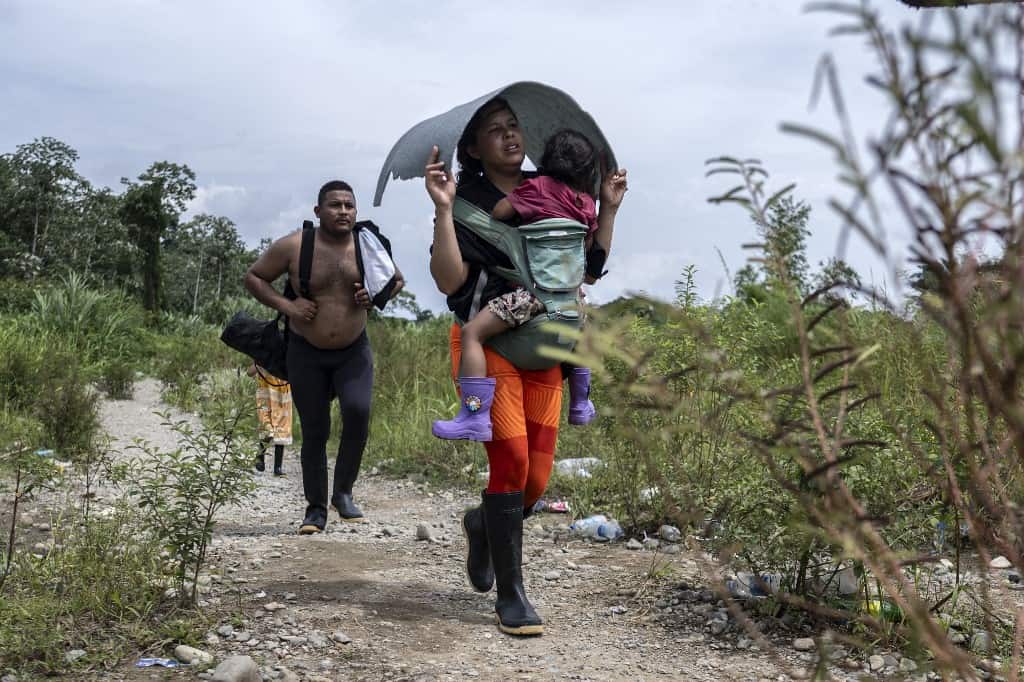Upon crossing the Tuquesa River, Venezuelan migrant Marcel Maldonado broke down in tears after having crossed the inhospitable Darien jungle on foot with an orthopedic leg, on the border between Colombia and Panama.
On one bank of the river is Bajo Chiquito, the first Panamanian village where a record number of about 3,000 migrants are arriving daily in search of the American dream, mostly Venezuelans, many accompanied by children.
The heat is stifling in this village of 490 inhabitants crowded with migrants who, after a long hike through the jungle for three, five or more days, finally get hot food and a safe place to sleep, although outdoors.
Apart from the natural obstacles of the jungle, such as rivers and cliffs, criminal gangs operate that rob, kidnap and rape.
Maldonado lost his right leg in a motorcycle accident a decade ago, but his disability did not discourage him from heading to the United States in search of a better life.
“The only thing I want is at least the last years of my father’s and mother’s old age, even if it’s just to give them a good life with food and groceries, which is what I dream about the most. That’s why I’m here in this struggle, otherwise I wouldn’t be here, [because] this shit is too ugly,” said the 30-year-old Venezuelan.
“My dad even sold the car just to support me too, I want to give him back something better,” he adds tearfully.
My dream
The Darien natural border, 266 km long and 575,000 hectares in area, has become a forced corridor for thousands of migrants who, from South America, try to reach the United States without a visa through Central America and Mexico.
Most are Venezuelan, but there are also Ecuadorians, Haitians, Chinese, Vietnamese, Afghans and people from African countries like Cameroon and Burkina Faso. There are people of all ages, even a one-month-old baby.
“You expose yourself to a lot of things happening, because that jungle is dangerous, there is rape, there is everything,” said Venezuelan Reina Torres, 77, who crossed the jungle with 12 family members.
Crossing the Darien “is very dangerous, risky, but necessary to achieve the dream,” says Mechu Falceinord, a 28-year-old Haitian who lived in French Guiana.
“What is my dream? Well, working, having my money, being independent, having a house, a dog, a child, something like that,” she adds.
They kept us kidnapped
In Bajo Chiquito there is a border police station (Senafront), whose officers patrol the jungle in camouflage uniforms and AK-47 rifles.
In the village, police check the precarious luggage of travelers and confiscate any objects that can be used as weapons, while immigration officials record their names and other data.
Nearly 390,000 migrants have entered Panama through this jungle so far this year, far more than in all of 2022, when there were 248,000, according to official Panamanian data. In 2008, the first year there are records, 28 people entered.
Migrants spend the night outdoors in Bajo Chiquito while lining up to board the dugout canoes that will take them the next morning to the Lajas Blancas shelter, navigating the Tuquesa River for almost three hours for a $25 fare per passenger. From there they continue by bus to the border with Costa Rica.
About 15 migrants fit in each canoe, which are about 12 meters long and have an outboard motor. About 200 leave Bajo Chiquito daily.
The village also has staff from UN agencies such as UNHCR and IOM, as well as Doctors Without Borders and the Red Cross to assist migrants.
Upon crossing the Tuquesa River, migrants feel relief as their walk through the jungle ends, where many lost their money and cell phones to robbers.
“They kept us kidnapped from 9 in the morning until 5 in the afternoon. They stuck their finger up my vagina and ass to see if I had money” hidden, said Venezuelan Nazaret Puerta, 28
“The jungle was dangerous, we went through the jungle four days ago, we didn’t drink water, there was nothing to eat,” says a migrant from Burkina Faso who identified himself as Utsman.
Security problem
The migrants leave a trail of trash in the jungle: boots, socks, plastic bottles, underwear, bras, cups, toothbrushes and diapers. There is also a lot of waste covering the banks of the Tuquesa River.
In Bajo Chiquito, locals opened food stalls, rent hammocks and camping sites, offer phone charging and Wi-Fi. For Panama this avalanche of migrants has become a security problem.
“We are talking about approximately 390,000 migrants so far this year,” says the head of Senafront in the area, sub-commissioner Edgar Pitti Valdés. “This massive flow of migrants has disrupted the normal coexistence of the populations.”






